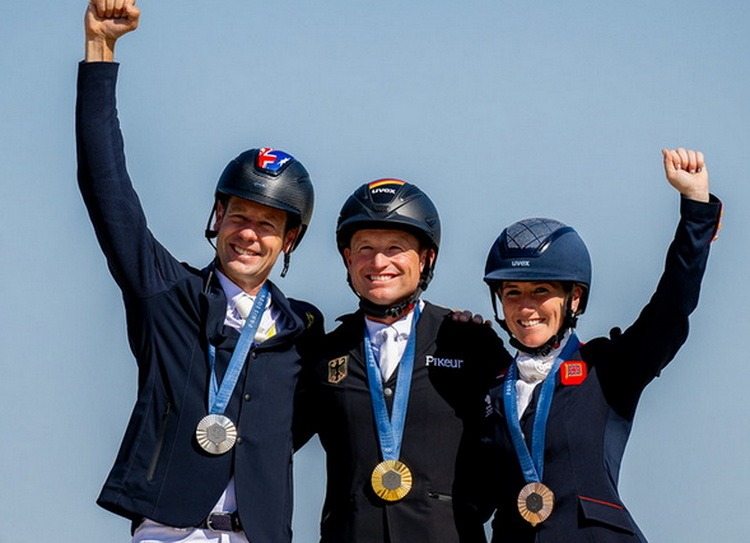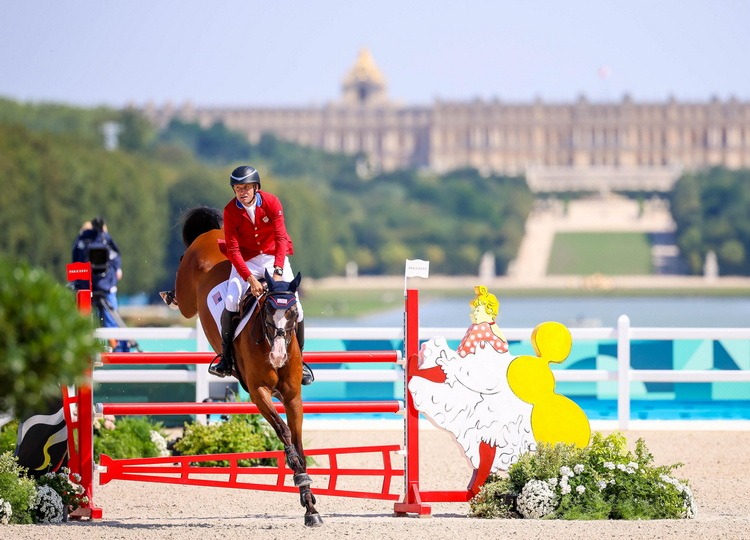It was a historic day at the Olympics, for Germany’s Michael (Michi) Jung and the British.
Let’s rename the country “Very Great” Britain.
The British eventing team of Laura Collett Ros Canter and Tom McEwen at the Paris Games defended its Tokyo team gold against a challenge from the home favorites, France, finishing on 91.3 penalties for three days of competition after a tense show jumping finale. It is the most successful nation in the history of eventing, now having earned team gold five times.
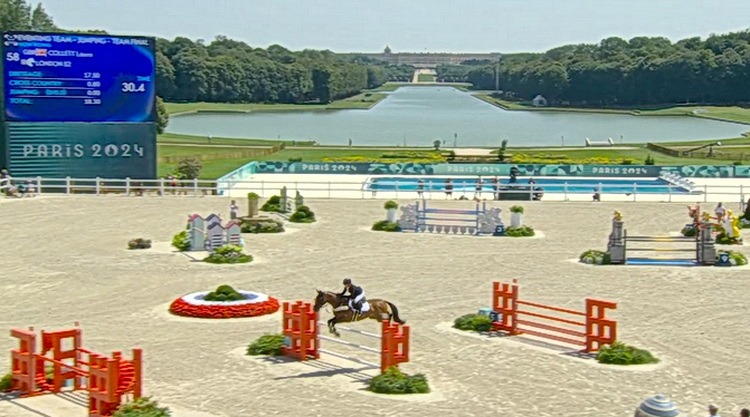
Laura Collett in the show jumping arena and a look at its fabulous vista.
Silver medal France had 103.6 penalties, while Japan — which has been getting better and better at the eventing game — made history itself by finishing on the Olympic podium in the sport for the first time with a score of 115.8 for the bronze. The U.S. wound up seventh with 133.7 penalties, 3.2 behind Sweden and 0.9 ahead of New Zealand.
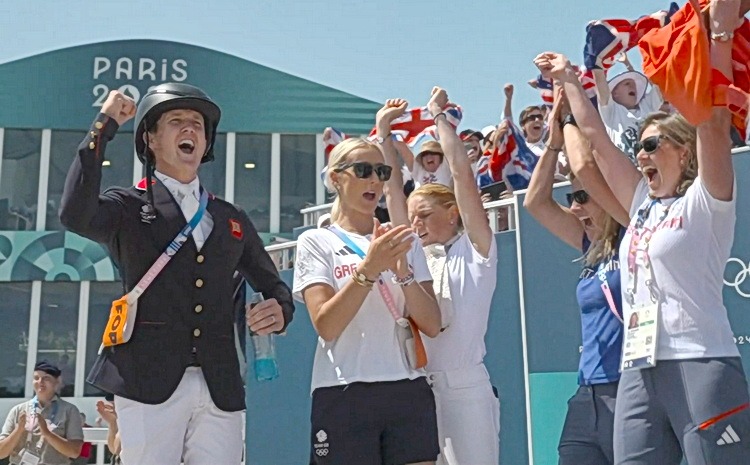
The British celebrate another gold medal.
Michi, who had a rail at the double in the team final, came back when it really counted in the individual final with Chipmunk FRH to post a clean round and is now the first person in history (there it is again!) to win three individual Olympic gold medals.
Australia’s Christopher (Burto) Burton was silver with just 0.4 time penalties over two jumping rounds added to his dressage score of 22 penalties. He had a bit of an edge in the final phase — he had been concentrating on show jumping when he turned back to eventing and started riding Shadow Man just this year.
As he heads back to Australia from Britain to start his own stable, he believes the horse, the former and future ride of Ben Hobday, will return to the owners.
“It would be my dream to keep riding him, he’s just the most delightful animal. From the minute I sat on him, I thought he was incredible, like we were made for each other, but I think anyone that sat on him would have the same experience I’m afraid, it would break your heart. But what a story we had and what a great time we had in Paris,” Burto commented.
And Laura Collett took individual bronze with London 52 on 23.1 penalties. She was fault-free in the individual round, but had a rail and 0.8 time penalties in the team jumping round. Without those errors, she would have had gold and foiled Michi’s historic moment.
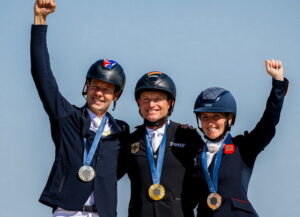
Silver medalist Christopher Burton, gold medalist Michi Jung and bronze medalist Laura Collett. (FEI Photo)
The first woman from Britain to earn an individual Olympic eventing medal in 16 years, she is an achiever who wasn’t going to be stopped by a fall that nearly took her life in 2013 and left her without sight in one eye. She set an Olympic record with her dressage score on Saturday, which made it an obvious prediction that she would be in the medals.
Even so, she said through tears of joy, “I never thought this day would come.”
“I owe everything to that horse and the team that made it possible just to get here. I’m so lucky to be the the one that gets to ride into an arena like that and come out with a team gold and individual bronze medal.”
Expressing her gratitude for the help people gave her along the way, she emphasized, “I want to say thank you to every single one of them. It’s so many years of hard work and blood, sweat and tears. Emotional rollercoaster doesn’t even do it justice.”
To others who have aspirations, she advised, “for moments like this, every bad day is so worth it. You just have to never give up, never lose faith. You can never dream too big.”
Michi’s campaign for a third gold was foiled at the 2021 Tokyo Games when he was in the lead, but received 11 penalties in a controversial issue with a MIM system device at a cross-country fence there. Some felt the call was quite unfair, as he had galloped off before a pole fell at a fence his horse touched, but now he has achieved what he set out to do three years ago.
Even someone as experienced as Michi had nerves to control in the last stages of his medal quest, as he rode in front of a packed and noisy stadium.
“I tried to say to myself it’s just a normal show,” he revealed.
“I try to push my horse not too much, to give him the feeling it’s a normal show, although it’s not so easy with so many spectators. In the end I needed to look at the board to see that it’s really true, and now I need a moment to realize what it means. It’s a very special moment for me.”
The U.S. wound up seventh, securing a spot in the top 10 after some rocky moments in the previous phases. With the gallant Federman B, Boyd Martin delivered two double-clears for America over the course designed by Santiago Varela and Gregory Bodo. The route was beautiful, with fences symbolizing various aspects of France and its history, including the street signs of Paris and the art of Toulouse Lautrec (seen in the photo below).
He finished tenth on 32.1 penalties total. Teammate Liz Halliday, originally the traveling alternate, was fifteenth on Nutcracker with 34.8 penalties. The third team member, Caroline Pamukcu and HSH Blake, finished thirty-seventh (66.8) and so did not qualify to be in the top 25 who contested the individual round, an hour after the team show jumping wrapped up.
Boyd noted how pleased he was with his horse, known as “Bruno,” saying, “He didn’t touch a jump in the warmup and came in the round and jumped like a superstar. I’ve got supreme confidence in Bruno’s jumping ability.”
He cited the help he got in the warm-up from trainers Peter Wylde and Erik Duvander. But as he wrapped up his experience in Paris, where his flying change problem in dressage foiled his medal hopes despite wonderful performances in the event’s other phases, Boyd observed, “it’s heartbreaking, to be honest. I feel like we’ve been so close so many times. This is my fourth Olympics and my career is probably in the second half now. I thought everyone tried hard, it’s a tough sport, a game of inches and I had all these dreams of wearing a medal and it’s not going to happen this weekend.”
U.S. Chef d’Equipe Bobby Costello was both philosophical and insightful while discussing his team’s experience at Versailles.
“I’ve had a lot of time to think about the weekend and I hope it doesn’t sound like I’m just being overly Polly Annaish, but I really truly believe that there were more positives this weekend and there are still signs that we are here competing with the rest of the world, we didn’t compete in this format to a level that was going to get us a medal this weekend.
“I think we have to get better at this Olympic format because it is unique, but we really do have to think about what are the things that we can definitely…concentrate on and improve that are going to make us more significant in a competition like this, which is unique. I’m heartened when I look at the quality of the riders we have here…they all have a deep bench of horses coming along. When I’m looking to the future, I get a little bit worried about the `deep bench of athletes.’
He wants to “really knuckle down and look into the next four years and map a blueprint of what it’s going to take to make sure the improvements keep going and that we’re always putting ourselves in a place where we can be competitive on a world stage. I feel so very hopeful about the trajectory we are on. We just have to stay focused and positive but not be patting ourselves on the back for being seventh. We need to be better than that, but we also can’t get discouraged, either.”
I was thinking about why the Brits are so great at eventing, and I believe part of it might be because the deep bench they draw on has a lot of experience foxhunting, or trail hunting or drag hunting. That really stands in good stead for cross-country. And eventing is also a popular sport in Britain in the panoply of equestrian disciplines, which encourages people to draw in at a variety of levels.Just my musings…
Click here for team results. Click here for individual results

